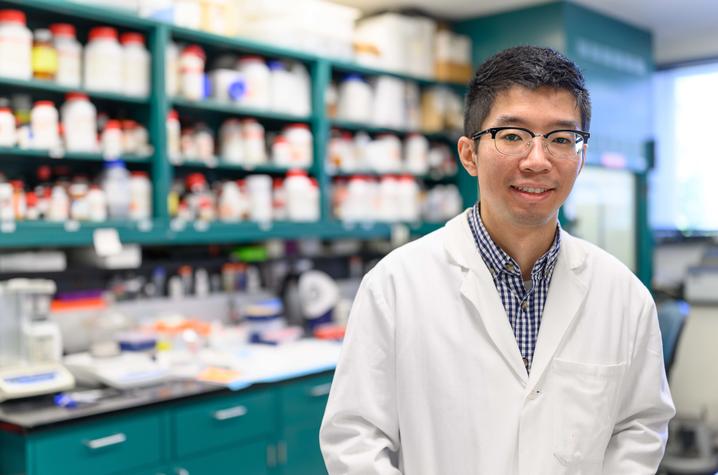New UK College of Medicine course focuses on healing power of food
LEXINGTON, Ky. (Nov. 17, 2022) — “For some reason, I really wanted fruit or savory food when I was going through treatment. Spicy, savory, salty food — that helped with my appetite,” recalls University of Kentucky chemistry doctoral student Yueming “Ronnie” Wu.
Back in 2020, he received an advanced colorectal cancer diagnosis at the age of 27. Wu went through six months of biweekly chemotherapy infusions and took chemo pills every other week. After that, he went through another aggressive treatment: cytoreductive surgery (CRS) with hyperthermic intraperitoneal chemotherapy that essentially washes the abdomen with hot chemotherapy.
“After every surgery, I’d lost at least 20-30 pounds,” said Wu. “And after chemotherapy, I could barely drink room-temperature water. I was incredibly sensitive to temperature and my taste definitely changed.”
Wu is not the typical patient. As a researcher at the Sanders-Brown Center on Aging, he says he’s “blessed” to have the knowledge of the impact of food.
“I know the consequences of what I eat,” said Wu. “Dietitians at the UK Markey Cancer Center gave me a comprehensive walk-through with food. It was pretty important I follow that.”
‘A new emerging field’
A new course in the UK College of Medicine is teaching future doctors how to incorporate healthy food options into care for patients like Wu.
Precision Nutrition and Advanced Culinary Medicine (NS 801) is a one-credit-hour medical elective offered online for medical students at all three College of Medicine campuses — Lexington, Bowling Green and Northern Kentucky.
Culinary medicine is an evidence-based field that blends food with the science of medicine. Its goal is to help people make good decisions on what they eat to help prevent and treat disease and restore well-being.
The course is a collaboration between Sara Police, Ph.D., who is an assistant professor and director of Nutritional Science Education in the Department of Pharmacology and Nutritional Sciences in the College of Medicine, and Chef Tanya Whitehouse, the Learning Kitchen program manager at The Food Connection within the College of Agriculture, Food and Environment.
“Culinary medicine is an emerging field,” said Police. “Medical schools across the nation are beginning to incorporate culinary medicine into their curricula. The prevalence of chronic diseases with a basis in nutrition in Kentucky is alarming, and we felt compelled to create this course for medical students at UK, as our next generation of health practitioners.”
The course integrates clinical, biomedical and culinary perspectives into eight weeks of study. Students learn about various prescriptive diets for a range of diseases that impact Kentuckians, like obesity, Type 2 diabetes, hypertension and cancer.
Culinary challenges put the information learned to practical use. Students focus on flavor to modify recipes for the Dietary Approaches to Stop Hypertension (DASH) and Mediterranean diets or take a case study on a cancer patient to create a smoothie full of nutrients while being mindful of taste and sensory changes.
Police leaned on Whitehouse’s experience in the kitchen to create the culinary challenges. Both emphasize the importance of nutrition education for College of Medicine students and future physicians.
“I feel like there are a lot of disease states that Kentucky is pretty high in that can be prevented with dietetic circumvention,” Whitehouse said. “The problem is when that patient or that caregiver goes home, what in the world are they going to make for dinner? That's where I think The Food Connection can really start to close that gap.”
The Food Connection works to bring locally grown food to campus and across Kentucky through partnerships with farmers, food producers, students and community members to develop vibrant and sustainable food systems.
“We’re also helping Kentuckians and saying ‘Here are some recipes. They're healthy, and they actually taste good. They can satisfy and can actually comfort you, even though it's not mac and cheese.’ It’s a way to get people to look at healthy food differently,” said Whitehouse.
“This course can increase and enhance the nutrition education for health professionals so that they have greater confidence in approaching the topic of food, which is a sensitive issue. Culinary medicine education equips future physicians with tools and strategies to impact health outcomes in future patients. So, any increase in confidence that a physician can have when discussing diet as medicine, the better,” Police said.
Wu is still doing well and is considered NED — no evidence of disease — after those aggressive rounds of treatment. He still credits his roommate, UK College of Law graduate Zachary Holt, for helping in his recovery. Holt made countless meals and kept up with Wu’s changing cravings during and after treatment.
“Zach would cook a variety of food. Basically, if I wanted something he would make it,” Wu said. “He may not have known how to cook it, but he would look up how. Food is definitely important in recovery because you absorb what you eat, all of those nutrients. It can help you with your recovery and feel better in general.”
*****
Medical students interested in registering for the course will be able to take it in Spring 2023. For questions about the course or the Nutritional Science Education program, you can email Police at sara.police@uky.edu.
For more information on the Nutritional Science Education program click here.
As the state’s flagship, land-grant institution, the University of Kentucky exists to advance the Commonwealth. We do that by preparing the next generation of leaders — placing students at the heart of everything we do — and transforming the lives of Kentuckians through education, research and creative work, service and health care. We pride ourselves on being a catalyst for breakthroughs and a force for healing, a place where ingenuity unfolds. It's all made possible by our people — visionaries, disruptors and pioneers — who make up 200 academic programs, a $476.5 million research and development enterprise and a world-class medical center, all on one campus.







